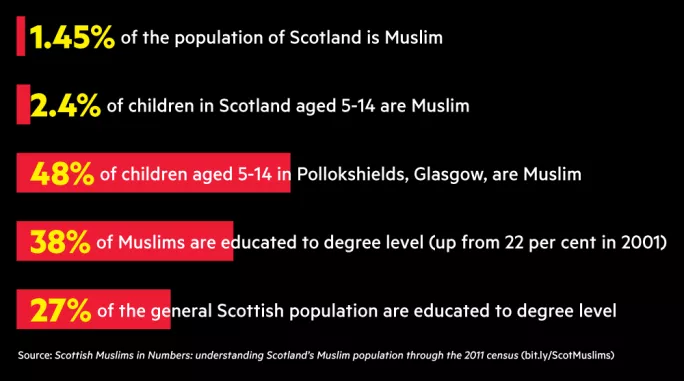New Muslim school would show ‘commitment to parity’

Scotland should establish a state-funded Muslim school to show its “commitment to parity” and offer more parental choice, according to a major new report.
The University of Edinburgh study concedes that such a move would be made amid anxieties around sectarianism, but argues that it would show a willingness to bring greater parental choice into Scottish schooling.
Meanwhile, the organisation driving one proposal for a state-funded Muslim school has railed against an “unacceptable” delay in finding out whether the government will back the idea.
The University of Edinburgh report, based on analysis of 2001 and 2011 census data, states that, given the “significant proportion” of school-aged Muslims in parts of Glasgow and Dundee, ministers could demonstrate their “commitment to parity by taking steps towards funding a Muslim school”.
It adds: “While there may be opposition from some quarters to the potential expansion of the faith school sector, in the context of real anxieties around sectarianism, for example, such a step would signal a solid intention to deliver equity in parental choice.”
‘Such a step would signal a solid intention to deliver equity’
The report comes after a UK-government commissioned review by Dame Louise Casey published this week highlighted “worrying levels” of segregation in British society.
The report, led by Dr Khadijah Elshayyal, highlights that Muslim children have endured racist comments in both primary and secondary schools in Scotland. It also identifies a need for public institutions to cultivate a “greater sense of belonging” in young people.
A Muslim school that welcomed children from all backgrounds, it argues, “could represent an opportunity for successful community engagement with the education system”.
The report also finds that Urdu is the fourth most spoken language in Scottish homes and calls for it to be included “more explicitly” in the national 1+2 languages policy.
But the report, described by the university as a “unique statistical insight into the Scottish Muslim experience”, also finds that Muslims often do well educationally: 38 per cent of adults are educated to degree level, compared with 27 per cent of the overall population.

‘Unacceptable’ wait
The most advanced proposal for a statefunded Muslim school in Scotland would, if successful, see the privately funded Al-Qalam Primary School in Glasgow expanding to take secondary pupils and become the state-funded Al-Qalam Community School.
A business plan for the proposed school says it would provide parents with “an alternative to the current education system, which is seen to be too uniform and lacks the required diversity to excel”. It would also “foster greater social cohesion”, “introduce healthy competition into the local education system” and “drive up educational standards”.
Despite pitching their case to first minister Nicola Sturgeon earlier this year, however, backers have become disillusioned after waiting more than a year for the government’s response. In a letter to education secretary John Swinney on 22 November, the Hometown Foundation - a body supporting a number of proposals for various state-funded autonomous schools in Scotland - said it was “unacceptable” that Al-Qalam had waited more than a year with “no substantive feedback”.
Director Bill Nicol expressed “extreme disappointment and frustration”. He said: “This is really not a good start in empowering teachers, parents and communities to achieve excellence and equity in education.”
A spokesperson for the Scottish government said it was aware of the proposals to establish state-funded autonomous schools, adding: “These proposals raise fundamental questions about the principles of school governance in Scotland and will be considered as part of the wider education governance review.”
Gordon MacRae, chief executive of the Humanist Society Scotland, said it seemed “counterintuitive” for the University of Edinburgh report to call for “segregated schooling” when it showed that Muslims were successful in Scotland’s existing education system.
“We believe that children of all faiths, and none, should be together in schools that encourage learning about religion…but that do not embody a single religious character,” he added.
Mr MacRae said that schools should be a “beacon of integration”, which was important at a time when global politics was fuelling heated rhetoric on immigration and religion.
You need a Tes subscription to read this article
Subscribe now to read this article and get other subscriber-only content:
- Unlimited access to all Tes magazine content
- Exclusive subscriber-only stories
- Award-winning email newsletters
Already a subscriber? Log in
You need a subscription to read this article
Subscribe now to read this article and get other subscriber-only content, including:
- Unlimited access to all Tes magazine content
- Exclusive subscriber-only stories
- Award-winning email newsletters